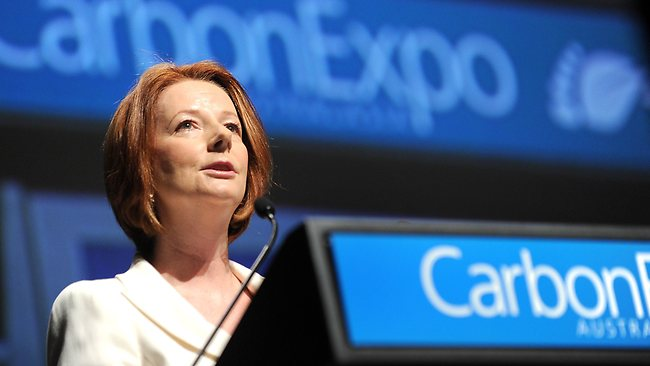Yesterday The Australian published my letter pointing out that Prime Minister Gillard had not established why the government has adopted a policy of reducing emissions of CO2. Today Ms Gillard has attempted to do that in the article below published in the Herald Sun. This can only be described as pathetic. Amazingly she does not even mention what is supposed to be the main object of the policy viz, to prevent or contain increases in temperatures. As Andrew Bolt points out in his contribution elsewhere in the Herald Sun (attached), “this carbon tax has nothing to do with actually stopping warming but everything to do with seeming to”.
Meantime, the AFR has published a letter by me similar to yesterday’s (see below) and press reports indicate that the government is already considering changes to its policy.
Des
Carbon Tax:
PM says change is never easy but benefits will flow
(letter by Julia Gillard published in The Herald Sun, 5 July 2012.)

Australian Prime Minister Julia Gillard says the benefits will flow from the new carbon tax. Source: AFP
FOR the past 30 years, footy has embraced difficult changes, like an independent commission and a national draft.
They've always had their critics but they've made the competition stronger than ever before.
Australians have a fair bit of common sense that winding back the clock is never really the best thing, whether it's for a footy club or for the country.
And I think in a few years' time, we'll think that getting rid of the carbon price would be a bit like reverting the AFL back to the VFL.
Change is never easy, but it's also never quite as bad as the doomsayers make out.
This week, we put a price on pollution.
Why? Because that pollution is damaging our environment. It's causing climate change and scientists tell us it's also causing things such as sea levels to rise.
It's a price that will cut Australia's carbon pollution by an amount that's the equivalent to 45 million cars coming off the road in 2020. And it's a price that will see our nation develop more clean energy projects and strengthen our economy.
This has begun already.
Here in Melbourne, in Brunswick, I've seen geothermal power, the heat that's in the Earth's crust, used to heat a building.
But we need so much more -- the world is changing fast and we can't afford to be left behind.
Did you know that in 2010, global investment in generating renewable energy, such as solar and wind power, overtook investment in generating energy from fossil fuels?
It's a market that is gathering pace globally with the greatest acceleration imaginable.
But here in Australia we have only just scratched the surface.
Having a price on carbon will help drive us to take advantage of these opportunities. Over the next 20 years, it will create tens of billions in investment in renewable energy and tens of thousands of green jobs.
And we are doing it the Labor way, by looking after those who need our help the most.
We're doing this by making big businesses that generate large quantities of carbon pollution pay for the pollution they generate.
This price will provide a real incentive to these businesses to work out, "How can I cut my carbon pollution, how can I change the way my business works so I can pay a lower carbon cost?".
Of course businesses will pass some of the cost through to the things that we buy in the shops -- a total of just under 1c in every dollar. And I am acutely aware of the financial pressure felt by many Australians; not just families, but singles and pensioners as well.
That's why we are taking some of this money from the polluters and giving it to Australians through tax cuts, family payment increases and pension increases.
Australian families and pensioners already received an initial payment in May or June to help with their utilities bills.
And this week, more than 1.8 million Victorians with incomes up to $80,000 will get a tax cut, with most getting a cut of at least $300 a year. We've also tripled the tax-free threshold to $18,200 a year.
So the vast majority of Victorians will come out either square or better off.
But now it's started and people have the opportunity to judge for themselves.
From this week, you can look around and ask yourself:
AM I getting cash payments and tax cuts?
ARE my groceries 20 per cent more expensive?
DOES a roast now cost $100?
And over the coming months, you can decide whether it is a wrecking ball or a sensible policy that charges big polluters to drive them to cut their pollution.
You decide.
Climate questions remain in play
(letter by Des Moore published in The Australian Financial Review, 5 July 2012.)
Prime Minister Julia Gillard suggests citizens should judge for themselves and “not listen to the pollies” on whether the carbon tax is a sensible policy. (“Generators’ move jolts MPs”, July 3). Quite.
But first citizens need answers to three important questions.
First, why Australian action to reduce CO2 emissions will reduce global temperatures when they have not increased since 1998 and did not increase between 1940 and 1977 even though emissions did.
Second, when does the government predict the conclusion of a binding global agreement that is essential to achieving the reductions supposedly needed to contain temperature increases.
Third, why Australia should take the lead in effecting such reductions when our contribution would be miniscule and we would lose international competitiveness.
Des Moore
Director
Institute for Private Enterprise
South Yarra Vic.